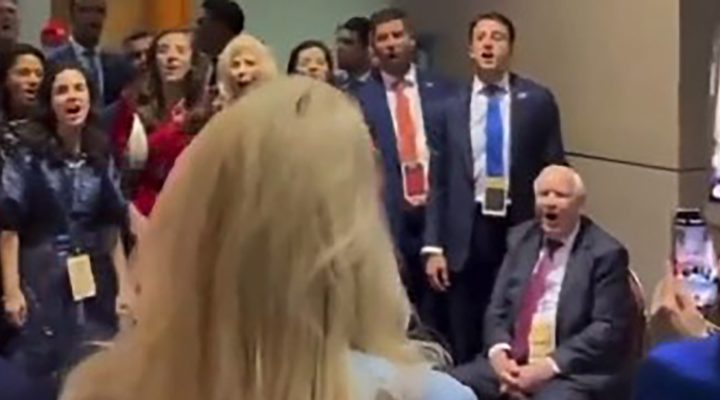Around 3 a.m. Eastern time on Nov. 6, a crowd gathered in the lobby of the West Palm Beach, Fla., convention center where Donald Trump had just delivered his victory speech. The crowd, which included Christian singer Sean Feucht, began singing the hymn “How Great Thou Art.”
The hymn, which became familiar to many through its inclusion in Billy Graham’s evangelistic campaigns as well as English-language hymnals published in the second half of the 20th century, is not without political connections. The English text is credited to a 1949 translation by British missionary Stuart Hine, who while serving in Ukraine discovered a Russian translation of a German translation of a hymn text originally written in Swedish in 1885 by Carl Boberg with the title “O store Gud” (“O Mighty God”).

Steven Harmon
Boberg was a lay minister in the Swedish Covenant Church who later served as a member of the Swedish Parliament. According to one of Boberg’s descendants, the hymn was a paraphrase of Psalm 8 and was sung in unsanctioned underground churches during a time when Baptists and members of the Swedish Covenant Church were being persecuted by the (Lutheran) church-state establishment.
The hymn’s most recent political application, however, was nothing short of sacrilegious.
It was sung by evangelical Christians who were very well aware of everything Trump has explicitly pledged to do if re-elected: Retribution against his political enemies, mass deportation of undocumented immigrants, the gutting of federal agencies responsible for functions of government that contribute to the flourishing of human life and of God’s creation that sustains it, and more. These proclaimed followers of Jesus gave praise to God for the election of the man they knew had pledged to do these things, the man who besides was twice-impeached, fomented a violent insurrection, was charged with federal crimes, and is a convicted felon and civil jury trial-adjudicated rapist. (They no doubt have explanations for each thing named here.)
Some who sang this hymn and many beyond that convention center lobby even regard him as anointed by God to save America as Matthew D. Taylor, scholar of independent charismatic Christianity and Christian nationalism, has been documenting.
“Only those who cry out for the immigrants can sing ‘How Great Thou Art.’”
It was a sacrilegious singing of “How Great Thou Art.”
“Only those who cry out for the immigrants can sing ‘How Great Thou Art.’” That was the application that immediately occurred to me of Dietrich Bonhoeffer’s famous pronouncement to his Finkenwalde seminary students, “Only he who cries out for the Jews can sing the Gregorian chant.”
It was directed against adherents to the Berneuchener Movement liturgical renewal movement in German Lutheranism, whom Bonhoeffer regarded as indifferent to the political situation of the mid-1930s. Thinking a little more about the context of the quote from Bonhoeffer made me realize the more direct contemporary parallel may be a little closer to home than the singers of “How Great Thou Art” in that convention center lobby.

Sean Feucht on election night. (From Sean Feucht via X)
In a letter Swiss theologian Karl Barth (who had been dismissed from his professorship at the University of Bonn in 1935 for refusing to swear the mandated loyalty oath to Hitler) wrote to Martin Niemöller (a pastor who had been imprisoned for his opposition to Nazi state control of the churches) in 1946 looking back on those years, Barth lamented the various matters of lesser importance with which various groups within German Protestantism occupied themselves after the retreat of the Confessing Church from political resistance, mentioning “the Berneucheners … in their mysteries” in ironic juxtaposition with “prisoners in their cells” who had “discovered everywhere the wonder of solitary contemplation.”
I do still find that instance of singing “How Great Thou Art” grossly offensive in light of its context. But the original context of Bonhoeffer’s pronouncement I immediately thought about in this connection may apply more directly to those of us in the days ahead who may lose heart in the hard work of crying out for all the vulnerable and marginalized who will suffer most under a new regime, as we may be tempted to retreat from the struggle for justice into a more spiritualized practice of our Christian faith.
“So let us not grow weary in doing what is right, for we will reap at harvest time, if we do not give up” (Galatians 6:9).
Steven R. Harmon serves as professor of historical theology at Gardner-Webb University School of Divinity in Boiling Springs, N.C. His most recent books are Baptists, Catholics, and the Whole Church: Partners in the Pilgrimage to Unityand Seeds of the Church: Towards an Ecumenical Baptist Ecclesiology (co-edited with Teun van der Leer, Henk Bakker, and Elizabeth Newman).
Related articles:
Of worship warfare, theocracy and a weekend with Sean Feucht | Analysis by Rick Pidcock
In the news this weekend: This is what it means to take God’s name in vain | Opinion by Erin Albin Hill
The mysteries of the Latino vote for Trump | Opinion by Rick Pidcock


